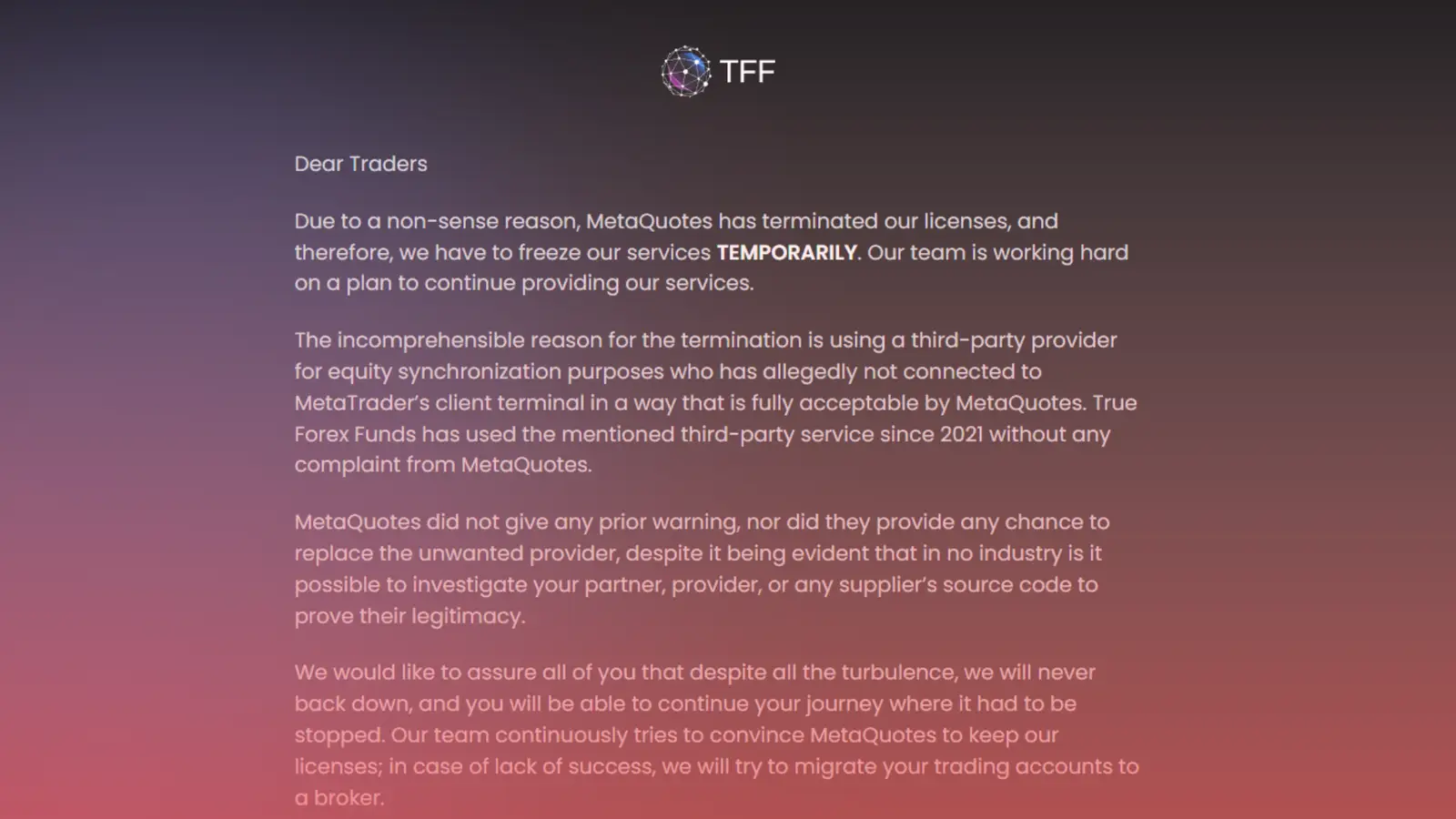Introduction of True Forex Funds Case vs MetaQuotes
In a surprising turn of events, True Forex Funds (TFF), a notable proprietary trading firm, faced a significant setback when MetaQuotes, the developer behind the popular MetaTrader trading platforms, unexpectedly terminated TFF’s trading license. This action temporarily halted TFF’s operations, sparking confusion and concern within the Forex trading community.
Background Information
True Forex Funds has been a key player in the proprietary trading space, offering traders the opportunity to trade with significant leverage based on their skill level. They are a Hungarian Forex proprietary trading firm founded in 2021. It stands out in the forex prop trading industry for offering traders from over 110 countries the opportunity to trade with up to $200,000 in funded accounts, boasting an impressive payout of $40,992,053.02 to traders in 2023.
MetaQuotes, on the other hand, is renowned for its MetaTrader platform series, which has become a staple in the Forex trading world.
The Conflict
The conflict stems from MetaQuotes’ decision, which they justified by citing a partnership between TFF and an unregulated broker. This partnership, according to MetaQuotes, violated the official guidelines for using the MetaTrader Client Terminal. Richard Nagy, CEO of TFF, labeled the termination as “incomprehensible and irrational,” highlighting the lack of prior warning or opportunity to rectify the situation.
TFF's Response
In response to the termination, TFF embarked on a mission to reassure its community, promising efforts to negotiate with MetaQuotes or, failing that, to transition their traders to another platform. They have since announced plans to adopt the cTrader platform, signaling a significant shift in their operational infrastructure to ensure continuity in their services.
Implications for the Forex Community
This situation sheds light on the complexities of compliance and regulatory requirements in the Forex trading industry. It raises important questions about the relationship between trading platforms, proprietary trading firms, and regulatory standards, highlighting the need for clarity and adherence to guidelines.
Conclusion
The unexpected conflict between True Forex Funds and MetaQuotes serves as a stark reminder of the challenges proprietary trading firms face in navigating the regulatory landscape of the Forex market. As TFF works to overcome these hurdles and move forward, their efforts underscore the importance of flexibility, compliance, and the ongoing pursuit of stable trading environments for their community.
Questions and Further Exploration
As this situation unfolds, there are more questions than answers, especially with the recent developments, including the shutdown of True Forex Funds’ website and their announcement blaming the issue on a ‘third-party license’. This conclusion raises several critical points of inquiry that the Forex community and observers are eagerly waiting to be addressed:
- Why couldn’t the third-party license issue be resolved more amicably? If the core of the problem was indeed with a third-party provider, one must wonder why a solution, such as replacing the provider or adjusting the service to meet MetaQuotes’ guidelines, wasn’t pursued more vigorously.
- Is there a deeper issue at play? The abrupt nature of the website’s shutdown and the vague references to a third-party license suggest there might be underlying issues or complexities not fully disclosed to the public.
- Could True Forex Funds have continued its support and payouts regardless of the license termination? The community is left pondering whether TFF had the means to sustain at least some level of operational continuity, ensuring traders and partners were not left in a complete lurch.
- What does this mean for the future of proprietary trading firms? This incident highlights potential vulnerabilities within the proprietary trading model, especially when it comes to dependencies on software licenses and platform partnerships.
- How will TFF’s transition to a new platform affect its traders and overall business model? Moving to a new trading platform like cTrader is no small feat. The implications for user experience, trading strategy compatibility, and performance metrics are significant.
- What lessons can the wider trading community learn from this ordeal? Beyond the immediate impact on TFF and its stakeholders, this situation serves as a cautionary tale about the importance of regulatory compliance, the risks of third-party dependencies, and the need for transparent communication.
As we await further details and responses from both True Forex Funds and MetaQuotes, these questions underscore the need for greater transparency and dialogue within the Forex trading ecosystem. The answers to these inquiries will not only shed light on the current predicament but also help chart a course for more resilient and compliant proprietary trading practices in the future.
Establishing a Secure and Compliant Proprietary Trading Firm
In light of True Forex Funds’ licensing challenges with MetaQuotes, the importance of prioritizing security and compliance when setting up a proprietary trading firm becomes evident. Collaborating with YourPropFirm can ensure your operation adheres to industry standards and best practices, thanks to their knowledge of legal frameworks, technology infrastructure, and broker relationships. This partnership aims to establish a durable and dependable trading firm, protecting against the operational and regulatory challenges present in today’s competitive market.
For more detailed information on beginning your venture with a trusted partner, consider visiting YourPropFirm’s website.




